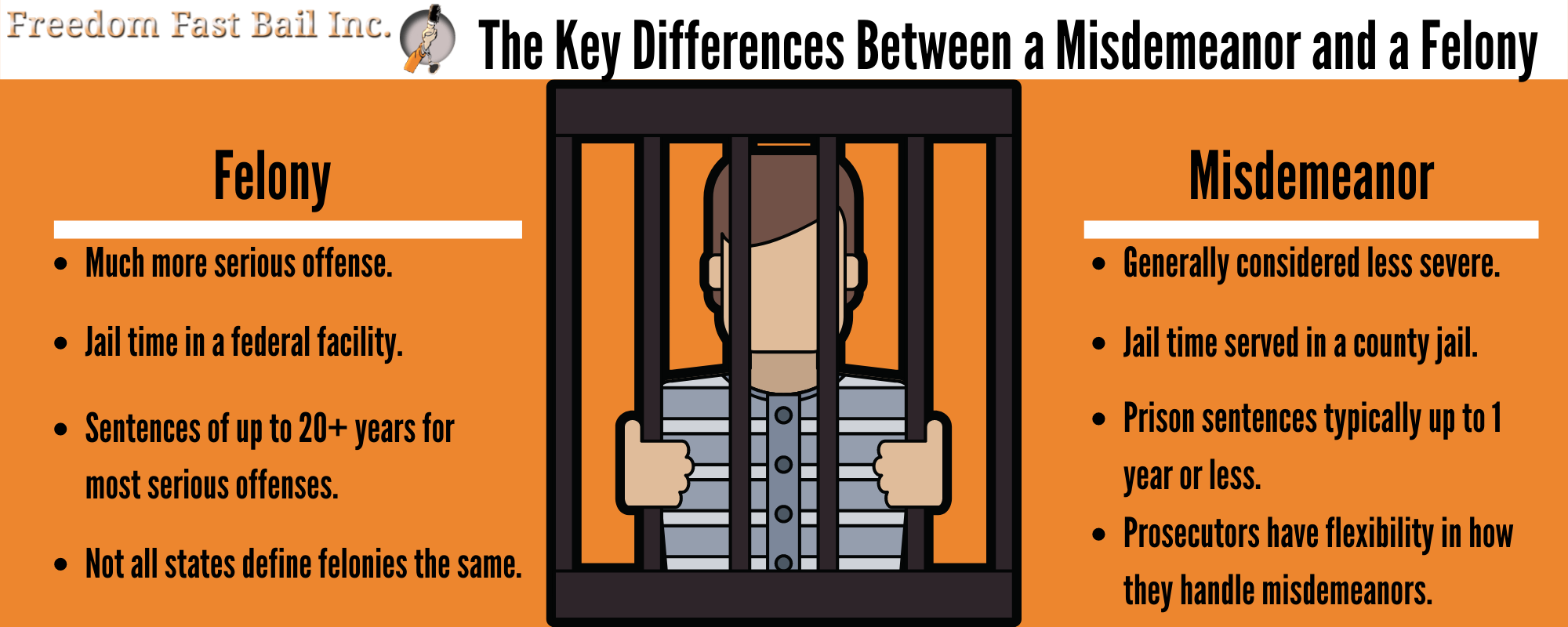What’s the Difference Between a Felony and a Misdemeanor?
It can feel like there is nothing you can do when a loved one is arrested and charged with a crime — but in reality, there is. When someone is arrested and detained for a crime, it can affect everything from their immediate life to their future. They cannot get to work or provide for their families. If they are convicted of a crime, they may be unable to find a job later.
To avoid this, the best thing you can do for someone is to help bail them out of jail. Bail is needed when someone is charged with a felony misdemeanor in Pittsburgh, PA. To learn more, contact your local bail bondsman in PA, Freedom Fast Bail Bonds, at (412) 368-5188 today.
WHAT DOES A FELONY MISDEMEANOR MEAN?
A felony misdemeanor is actually a misnomer. In our criminal system, there are criminal offenses known as felony and misdemeanor. They are two separate categories to punish differing crimes that may be committed. That means that someone can be charged with either a felony or a misdemeanor, but rarely can they be charged with both. For that to happen, they would have to commit multiple, serious crimes.
Both felonies and misdemeanors have several categories. Meaning, you could be charged with a class one misdemeanor or a class three felony. They break down as such:
FELONIES:
- First Degree Felony: These are serious crimes that carry up to 20-years in prison and fines up to $25,000.
- Second Degree Felony: Just as serious crimes, but can carry 10-year prison sentences with fines totaling no more than $25,000.
- Third Degree Felony: Crimes that can see up to 7-years in prison and up to $15,000 in fines.
MISDEMEANORS:
- First Degree Misdemeanor: crimes that can see up to 5-years in jail with fines up to $10,000.
- Second Degree Misdemeanor: crimes that can carry up to 2-years in prison and fines totaling no more than $5,000.
- Third Degree Misdemeanor: offenses that may see up to 1-year in jail with fines totaling $2,500.
It’s important to note that with a felony charge, you could be sent to state prison. With a misdemeanor charge, you will be held in the county jail. More than that, some crimes carry mandatory minimum sentencing. This means you’ll be automatically charged with something like a DUI charge or weapons charge, meaning you’ll need weapons violation bail in Pittsburgh, PA. Understanding what can happen to you will help you understand what you need to do going forward.
Felony vs Misdemeanor

The felony and misdemeanor differences come down to the punishment for the crime. Generally speaking, felonies are considered more heinous or more offensive; therefore, harsher penalties are handed down. With felonies, different states carry different definitions of what constitutes a felony and what the ensuing punishments will hold.
Each class of crime requires a specific type of bail bond to get them out until their hearing. For a felony bond, the person under arrest can offer up collateral to get them out of prison until their scheduled court date. With felonies, the bonds are typically set at a higher level to match the crime’s severity. With misdemeanors, the bail bonds are slightly more flexible due to the crime’s less severe nature. However, if you fail to appear for your court date, more complications will arise and make your life more difficult.
When you know the breakdown of how these crimes are viewed within the system, you must understand what is classified within specific categories. Here are a few felony and misdemeanor examples.
Felony Examples
- Manslaughter
- Aggravated Assault
- Theft
- Burglary
- DUI with Vehicular Homicide
- Drug Possession with the Intent to Deliver/Sell
- Vandalism/Criminal Mischief
- Arson
Misdemeanor Examples
- DUI
- Drug Possession
- Reckless Driving
- Simple Assault
- Resisting Arrest
- Disorderly Conduct
- Burglary
- Theft
- Trespassing
You may notice that there are a few that overlap the felony and misdemeanor sections. That’s because, ultimately, a theft or burglary charge can be determined to be either or based on several things. The judges discretion, your criminal background, and more. It’s because of situations like is that it’s so important to make bail as soon as you can.
Frequently Asked Questions
- How many misdemeanors is a felony?
- There is no specific or exact answer because, ultimately, misdemeanor charges do not turn over into felony charges. If and when that happens, it is because a judge or jury determines your actions to be worth a felony charge. It has nothing to do with how many misdemeanors you are charged with.
- Can you go to jail for a misdemeanor?
- Yes, you can. Jail time for a misdemeanor will be dependent on the crime committed. The most common misdemeanor, traffic violations, are usually only punished by a fine, but more serious actions could experience up to 1 year in jail as well.
- How serious is a misdemeanor on your record?
- Though a misdemeanor is considered a “minor-wrongdoing” it is still a crime. Crimes are serious offenses that, if not taken seriously, can affect your future. Even misdemeanors can affect your job applications, ability to work, and more.
- Is a felony worse than a misdemeanor?
- By definition, misdemeanors are considered offenses lower than a felony. Misdemeanors are often punishable by fines and possible jail time. That in mind, misdemeanors can still have an impact just as negative as a felony charge or conviction.
- Can my misdemeanor charge be upgraded to a felony charge?
- Yes, there are cases where the factual evidence may result in your misdemeanor charge becoming a felony. In these cases, your misdemeanor charge will be dismissed — but a new felony case will be filed.
- How long does my felony or misdemeanor charge stay on my record?
- Both felonies and misdemeanors will stay on your record until you are 70 years old and have not been convicted of anything within 10 years of your initial sentence ending. However, there are programs for misdemeanors that can help clear your record if you are not convicted.
- Is a misdemeanor considered a criminal offense?
- Yes, misdemeanors are criminal offenses. However, they are often determined to be less offensive in nature than felonies, but that does not make them any less serious. A misdemeanor can remain on your record as a criminal charge or conviction.
CALL US TODAY TO LEARN MORE
While the punishments for misdemeanors and felonies differ significantly in severity, both can greatly impact your future in multiple ways. Convictions of both types can hinder your ability to get a job in the future, keep you away from your family for extended periods, and have other unforeseen consequences.
When you or a loved one needs help with a felony misdemeanor in Pittsburgh, PA, rely on Freedom Fast Bail Bonds. We are not here to judge you; simply help you when you need it most. Dial (412) 368-5188 to talk to someone today.


